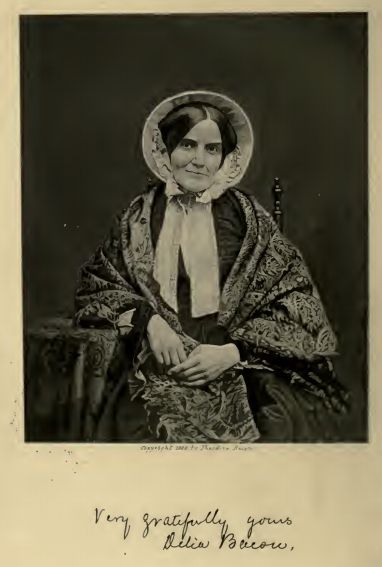n
n
n I mentioned the name of Delia Bacon yesterday and saidnI’d return to her work, so here we are. Hers was one of the earliest to putnforward the proposition that the works of Shakespeare were not written by a mannof that name who came from Stratford-upon-Avon, but were actually written bynother men. This idea begins simply enough. There are things in the plays thatncould not have been written by a person of Shakespeare’s class and education.nHe would not have had the experience of, let’s say, court life and etiquettenbut yet the procedures and customs are portrayed in such a way that they cannotnhave been written by someone unacquainted with them and so must have beennproduced by an ‘insider’. Delia Bacon thought that the works were written bynsuch courtly men, she believed that Sir Francis Bacon was the hand behind thenplays, assisted by others, including Sir Francis Drake, written to encode theirnradical philosophy and republican sensibilities, with which they could not publiclynbe seen to be associated. It’s a valid enough hypothesis, worth examining ifnonly to prove its invalidity.
n
n
n
n
n
n
nMiss Delia Salter Bacon was born in a log cabinnin Tallmadge, Ohio on February 2nd 1811, the daughter of DavidnBacon, a Congregationalist minister and his wife, Alice. David Bacon had hopednto found a Christian community in the wilds of Ohio but his plans failedn(although the town of Tallmadge later prospered and grew) and the familynreturned to New England, where he died, aged 46, in 1817. His death left thenfamily in severe poverty and what little money was available for education wasnspent on Delia’s elder brother, Leonard, who went on to become a minister.nDelia’s formal education ended when she fourteen but she attempted thenfoundation of several schools of her own in and around Connecticut, all ofnwhich failed, as did her attempts at working in the schools run by others.
n
n
n
 |
| Delia Bacon – Tales of the Puritans – 1831 |
n
n
n
nShenwrote a novel, Tales of the Puritans, at the age of twenty but it wasnnot hoped-for success and poverty, disaster and disappointment continued tonfollow her (although she did beat Edgar Allan Poe in a short story competitionnin 1832). She tried again with The Bride of Fort Edward, which began itsndays as a stage-play before it was rewritten and revamped, retaining somenblank-verse dialogue, and eventually published in 1839. It flopped badly,nleading to more debts and this failure diverted Miss Bacon from her literarynpretensions for a number of years, during which she attempted to rectify thendeficiencies of her early schooling, returning to what little Latin to whichnshe had been exposed and turning also to Greek.
n
n
n
 |
| Delia Bacon – The Bride of Fort Edward – 1839 |
n
n
n
nShe began to give lectures onnhistory, delivered without notes, for which she began to gain a favourablenreputation and from which she earned enough to pay off her earlier debts. Shenbegan at Hartford, Connecticut, then moved to Boston, Cambridge, New York andnBrooklyn, delivering her talks to parlours of like-minded ladies, all verynmodest, refined and genteel. She was, by what accounts we have, very good at itn– interested and interesting, commanding and knowledgeable, expressive andndignified.
n
n
n
nHowever, the unrelenting toil and her failing health began to tellnand in 1852, she was to give the last of her history lectures. There was also,nto use the terminology of her day, ‘a grievous and humiliatingndisappointment’ – a friendship with a young theology student, AlexandernMacWhorter, ended when her brother Leonard intervened; there may have been anhint of romance, possibly a proposal, something deeper than mere friendship,nmaybe even something physical but it came to an end, breaking her heart andnleading to a rift with the Connecticut Puritans of her early life.
n
n
n
 |
| Leonard Bacon |
n
n
n
nIt may justnhave been filial concern but brother Leonard doesn’t come out of this well;nindeed, he comes across as the archetypal smug, uptight, interfering,njudgemental New England Puritan preacher. You know, the sort of bloke younwouldn’t get tired of punching in the mouth. She became ill, possibly sufferingnfrom a nervous breakdown, and spent the summer at a hydropathic spa at Round Hill,nwhere she determined to visit England to research a notion she had that someonenother than Shakespeare had written the plays.
n
n
nQuite what went on in her mindnwhen she was separated from friends and family at Round Hill, we will nevernknow. She was in virtual solitary confinement, locked away with her thoughts,nshe neglected herself, seldom eating or sleeping, and took no exercise,ndevoting herself instead to her studies of Shakespeare and Sir Francis Bacon.nWounded, bodily and mentally, her imagination went into overdrive. Maybe it wasnjust the coincidence of their surnames that drew her to Bacon; maybe there was,nway back in history, some ancestral link. Did she believe her forbearer wasnbeing denied the glory that was being showered on a glover’s son fromnStratford? Did she believe that there was a hidden meaning locked away withinnthe plays, that she could discover? Prior to this illness, she had let it benknown that she disputed Shakespeare’s authorship and some of the ladies to whomnshe had lectured were already concerned about this interest.
n
n
n
 |
| Mrs John Farrar – Recollections of Seventy Years – 1865 (1866 ed.) |
n
n
n
nEliza Ware Farrar,nsecond wife of Harvard professor John Farrar, attended Bacon’s lectures andndevoted a chapter about her in her Recollections of Seventy Yearsn(1865), in which she mentions concerns about Bacon’s ‘monomania’ withnShakespeare, to such an extent that his name was never mentioned in Bacon’snpresence and even books by or about Shakespeare were hidden from her view. Suchnconcerns notwithstanding, patrons in New York provided her with ample fundsn(and a handsome new wardrobe) to be able to afford a visit to England and inn1853 she left for London.
n
n
n
nTomorrow – what happened next.
n
n


